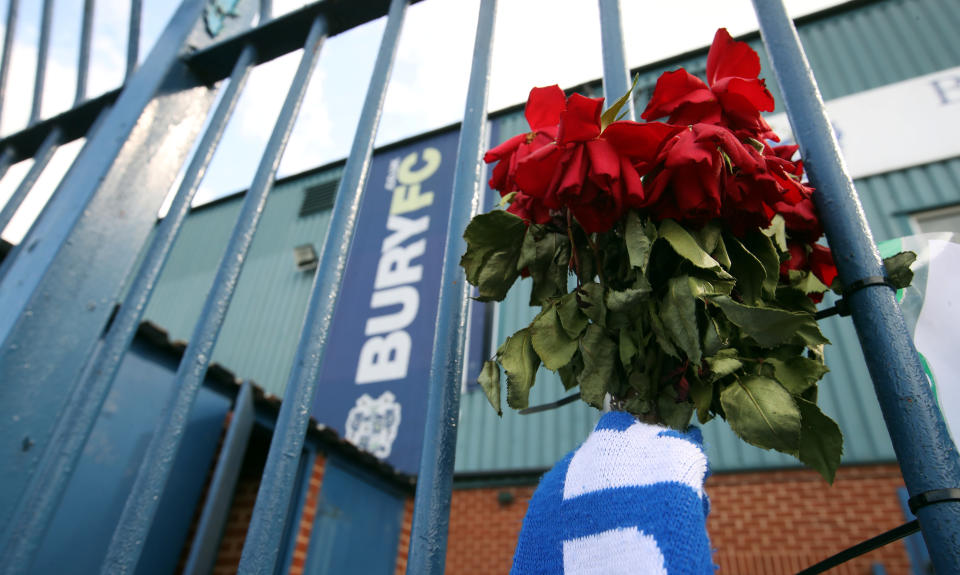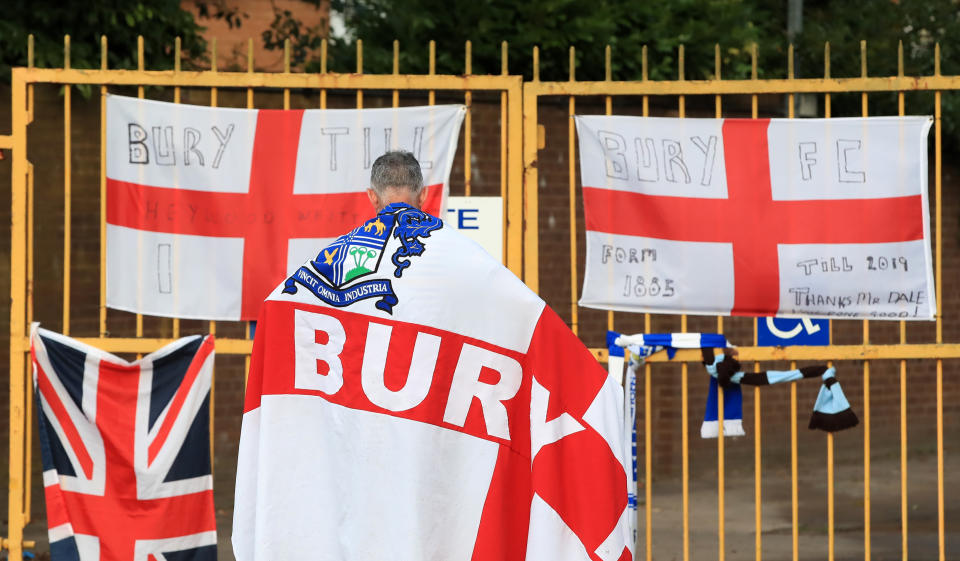How Bury FC ceased to exist, and the question its tragic tale poses to all of soccer
Professional soccer lost a team last week. And if it doesn’t reconsider what the ultimate objective of its clubs is, it will lose more.
It’s instructive for the problem itself that the news of Bury and Bolton mostly got lost in the shuffle of Premier League glitz and La Liga glamor and the Bundesliga spectacle. But two professional soccer teams nearly ceased to exist last week. One of them actually did.
Bury FC was a mainstay in England’s highest division until the 1930s and won the FA Cup twice. It still played in the third-tier Football League, a very respectable place in the global scheme of things. But now it’s been erased, expelled from the English Football League after 125 years of membership. The money had run out. Nobody could be found to save it. After forfeiting its first five games of the season, Bury became the first English club to fold since Maidstone United and Aldershot in 1992. Before that, this terrible fate hadn’t befallen anyone going back to 1962.
More or less at the same time, Bolton Wanderers, a Premier League team as recently as 2012, very nearly suffered the same sorry end. It hadn’t paid its bills or played its games in four months and was on the verge of liquidation. It was saved at the last minute by a consortium that included the drummer of Pink Floyd. It remains to be seen if these new owners will set things right.
There are dozens of troubled clubs in England’s four professional divisions, not to mention in every other soccer nation. And most of them have bad owners in common. Bury was controlled by a businessman who bought the club for one pound in December but didn’t actually have the means to cover its expenses, let alone the knowhow to make an indebted team financially viable.

One prospective buyer for Bolton – who was ultimately and wisely kept at arm’s length – was a shady figure who had already been declared bankrupt twice and banned from soccer for three years for his financial misdeeds while involved with Watford.
But while there’s a clear problem of due diligence, that only partly explains the issue.
The cost of doing business as a professional soccer team has become too high. Year by year, operating a professional soccer team has become more expensive, even when adjusted for inflation. The cost of running a club keeps going up as the prestige leagues raise more and more TV and commercial revenue and inflate the pay scale for everyone up and down the pyramid. In order to stay competitive, to keep pursuing that higher tier, you’re practically obligated to live outside your means.
What’s curious is that attendance in England’s lower leagues is as strong as it’s been in many years, decades even. Bury’s attendance was actually pretty good for a League One club. Clubs have gotten better at attracting sponsors and generating income from their fans. There aren’t structural problems on the earnings side of the balance sheet. It’s all on the expenses side. Those wagers and transfer fees, bloated from the riches of the Premier League trickling down into the lower leagues. Lots of teams have player payrolls much higher than their revenues, meaning they run a deficit before myriad other costs are even covered.
It makes you wonder if England really needs 92 professional teams across those four divisions – well, 91 now. If it needs 71 teams below the Premier League. Several, in desperate need of a cash injection, have had to sell their stadiums and rent them back.
Is consolidation the answer? Should the poorly run teams be allowed to die to streamline the whole thing – in England and in every other country where clubs are perennially in financial distress?
That feels heartless and destructive of the culture that makes soccer unique.

As the entire world consolidates through globalization and commercialization, as major cities gobble up smaller ones and everything becomes homogenous and indistinguishable, soccer teams stand in symbolic resistance to that rising tide. There is no clearer evidence that you are in fact a place than having your own team. These clubs, storied and loved and supported, mean something to their communities. They represent self-determination and belonging.
The question then becomes, are they businesses or are they some kind of public good that ought to be protected through trusts or subsidies or fan ownership? Are big teams under any obligation to save the poor ones?
Manchester City offered Bury the use of its old training facility for free on the condition that it would handle the upkeep. But Bury couldn’t manage that cost either, even if it saved a significant sum from running its own facility. Now League One is down a team and 23 clubs will finish the season. One less club will be relegated to League Two this year and then figuring out its numbers will be the fourth tier’s problem. The issue tumbles down the leagues.
Soccer will eventually need to reckon with an existential question: Is it a business, or is it something more than that? And if so, how does it keep the success of the rich from devouring the poor?
Leander Schaerlaeckens is a Yahoo Sports soccer columnist and a sports communication lecturer at Marist College. Follow him on Twitter @LeanderAlphabet.
More from Yahoo Sports:


